- Home
- Thomas H. Cook
Sacrificial Ground Page 6
Sacrificial Ground Read online
Page 6
Brickman’s voice hardened as he once again released the folder. “What the fuck you think you’re doing, Frank?”
“I want this case.”
“Since when does it matter to you what case you’re on?”
“Since right now.”
“You got some connection to it?”
“No.”
“Some special expertise, something like that?”
“No.”
“Any reason I could give for keeping you on it? I mean one that would hold up on the top floor?”
“Nothing. Just a feeling.”
Brickman stared at him quietly. “You know Harry Gibbons?”
“Yeah.”
“Would you say he’s the best detective in Homicide?”
“Yeah, I guess he is.”
“Takes these special goddamn courses all the time, right? Goes to night school? A real top-gun?”
“That’s what they say.”
“Just like the Mounties, always gets his man.”
Frank nodded.
“Well, Gibbons wants this case, too, Frank,” Brickman said. “Now what would you do in my situation? Think about it. You’ve slouched around here, pissing away month after month.” He stopped. “And by the way, what the fuck happened to your face?”
Frank said nothing.
“Ran into a swinging door?” Brickman asked dryly.
“Personal business,” Frank said. “It has nothing to do with my work.”
“Uh huh,” Brickman said unbelievingly. “Anyway, if you had a case you needed to break, wouldn’t you hand it to Gibbons?”
“Probably,” Frank admitted.
“So why shouldn’t I?”
“Because in his heart,” Frank said, “Gibbons doesn’t give a damn about anything.”
“That don’t mean a goddamn thing to me, Frank,” Brickman said.
Frank looked steadily into Brickman’s eyes. “Years back, Asa, if some peckerwood mayor had told Gibbons to go waste some big-mouthed, agitating nigger, what do you think he’d have done?”
Brickman’s face softened slightly, and a slow smile stretched across his lips. “All right, Frank,” he said, after a moment, “I’ll let you hold on to it for a while. But I don’t want you on it alone.”
“I won’t work with Gibbons,” Frank said flatly.
“How about Alvin?”
Frank shook his head. “Caleb Stone.”
“That old fart?”
“Yeah.”
Brick laughed lightly. “That old bastard have a feeling for this case, too?”
Frank shrugged. “I can work with him, that’s all.”
“Okay. I’ll put Caleb on it. You want to tell him, or you want me to?”
“I will.”
“You working anything else?”
“That guy who killed his wife over on Highland.”
“That’s pretty open and shut, right?”
“Yes.”
“Mind if I throw it to Gibbons?”
“No.”
“Okay, done,” Brickman said. “You just work this one, nothing else. But don’t fuck it up, Frank. You won’t get another chance.” He turned quickly and walked back out of the room.
Frank returned to the lab report and began to scan its findings once again. Slowly, his mind shifted from Angelica to her sister, and he remembered the forceful way in which she had managed to control herself. He wondered if Angelica had shared that characteristic, if she had been able to sit in a chair and calmly inject her own body with poison seven times. It seemed beyond anyone’s capacity, no matter what the lab report said. The method was too protracted, the results, as he imagined them, too unendurably painful. He had seen his share of deaths: crudely slashed wrists deep in bloody water, faces blown away by shotgun blasts, bodies slumped limply to the side, the smell of gas still rising from their clothes. The reasons were almost always the same, a loneliness and isolation so complete that it closed them off from the rest of the world, locked them in a dark drawer from which they could not even imagine an escape.
He tried to picture Angelica with the hypodermic needle in her hand, but found he could not. He saw her picture in the yearbook and her body sprawled on the ground, but could imagine nothing between the ordinariness of the one and the perversity of the other.
He was still struggling to find some line that might connect the two when Caleb walked up to his desk.
“Saw Brickman downstairs,” he said, his lips fluttering around the stem of his pipe. “He said you wanted to see me.”
“We’re going to be working together on the Devereaux case.”
“Well, that’s real nice, Frank, but I’m pretty damn busy already.”
“Your cases will be reassigned.”
Caleb frowned. “Who’s going to get them?”
“Gibbons is getting mine,” Frank told him. “I don’t know about yours.”
Caleb shook his head resentfully. “You know what’s the matter with this department? They don’t ever let you get rooted in anything. They’re always shifting things around. Half the time, there’s no sense to it at all.”
“That’s the way it is,” Frank said dryly.
“Five people get axed to death in a holdup, they’re liable to hand it over to robbery detail.”
Frank handed him the lab report. “Read this.”
“I already have,” Caleb said. “You know that.”
“Read it again.”
“Why?”
“Because things jump out at you,” Frank said. “Things you didn’t notice before.”
“Not in this one,” Caleb insisted. “I know the answer to this case.” He dropped the file on Frank’s desk. “Here’s the way it happened. A pretty rich girl got pregnant by a pretty rich boy. Nobody wants this kid. Lots of bullshit involved, maybe even some very pissed-off parents, the kind that take away your new car, along with all those big plans for college.”
“So the father of the child killed Angelica?”
“If she was murdered,” Caleb said. “It could have been just what the lab boys said, a bungled abortion.” He blew a column of smoke past Frank’s head. “What have you got on it?”
“I brought her sister down to identify the body.”
“She tell you anything?”
“Not much. They lived together. A big house on West Paces Ferry.”
“Anything else?”
“I didn’t try to press her,” Frank said. He took out his notebook. “She did tell me that Angelica had just come into a lot of money. Before that, it was all handled by her guardian.” He flipped another page. “Arthur Cummings. He’s with some big law firm.”
“A real big firm,” Caleb said. “Didn’t he think about running for mayor a few years back?”
Frank nodded. “Yes, I remember that.”
“But he never tossed his hat in the ring,” Caleb said. “Hell, it wouldn’t of mattered if he had. Old money. White money. They got the power, but they don’t get the office anymore, not in this town.”
“I was thinking of going to see Cummings this morning,” Frank said.
“Want company?”
“No. I want you to get copies of Angelica’s picture to give out on the canvass.”
“You won’t get a thing from that,” Caleb said confidently.
“Try it anyway,” Frank said. “Headquarters would want that covered.”
Caleb tugged wearily at his drooping trousers. “This shit’ll take all day, you know.”
“Let me know what you find out.”
“Yeah,” Caleb said, as he turned heavily and trudged out the door.
Frank pulled the telephone book from his desk and looked up the Cummings law firm. It was in one of Atlanta’s glittering midtown towers, and he quickly wrote the address and phone number in his notebook. Then he glanced at his watch: nine-thirty. If Cummings were like most ambitious, hard-driving Southern lawyers, he’d have already been in his office for two hours.
He was on his way
toward the door when Gibbons suddenly came through it.
“Hey, Frank,” Gibbons said, slowing as he came nearer. “Got a late start this morning.” He smiled cheerfully. “Anything on the night beat?”
“Nothing.”
Gibbons straightened his bright yellow tie. “No untimely deaths, huh?”
“No.”
“What about that girl they found over on Glenwood?” Gibbons asked. He shifted his own personal volume of the FBI Uniform Crime Report. “That a kill?”
“We don’t know yet,” Frank said.
“If it’s a kill, it’s a prime collar. You still on it?”
“Yes.”
A glimmer of surprise passed over Gibbons’ face, and Frank suspected that someone at headquarters had already tipped him off that the case was going to be shifted to him. Gibbons always had a jump on everybody else when it came to knowing what was coming down from the top floor. He played tennis with the chief of detectives and handball with the head of Vice, and on Sunday, he ended up at the Mount Pyron Church of God wailing for salvation from the same pew as two members of the city council. There wasn’t a wheel of government he hadn’t greased, and because of it, information flowed down to him like manna.
“Well, let me know if you need an assist on this one,” Gibbons said cheerfully. “I mean, we’re all in this together.” He smiled thinly, and just behind his lips, Frank thought he could see the pale, starving features of his soul.
7
It was almost ten when Frank got to the offices of Arthur Cummings. They spread out across the top floor of one of the city’s most elegant towers, and as he stepped into its spacious reception area, Frank could almost hear the rustle of the hundreds of briefs and motions and appeals which had paid for it. The carpet was scarlet, and very thick, and the paneled walls were decked with a lavish display of paintings. A brass chandelier hung from the ceiling, and its bright light fell over an array of flowers and potted plants.
The receptionist sat behind a large wooden desk, her fingers moving nimbly over a bank of phones. She was dressed in a skirt and blouse that were almost as red as the carpeting, and she had the pliant, yet calculating look of a woman who knows that she is surrounded by rich and powerful men.
“May I help you, sir?” she asked as Frank stepped up to her desk.
Her tone was a bit stiff, and Frank noticed that her eyes gave him a quick, dismissive glance, the sort that falls on all the wrong things, the slight stain on his tie, the unpolished shoes, the suit from so many seasons past that she seemed to be surprised that such relics still survived in her more modem world. It was the kind of look that reduced one kind of man while it exalted another, and under it, Frank felt himself utterly reduced, a ragamuffin cop with a swollen eye and a pocketful of loose change.
“You wish to see someone?” the woman asked.
“Arthur Cummings,” Frank said crisply.
“Mr. Cummings?” the woman asked doubtfully.
“Yes.”
“Do you have an appointment?”
“No.”
“Well, I’m afraid you’ll have to make one.”
Frank shook his head. “I don’t have time for that.”
The woman stared at him lethally. “What was that?”
“Is Cummings here?”
The woman did not reply. Instead, she looked at him as if she knew quite well that any further discussion would be held in the lobby between Frank and the building’s largest security officer.
“As I mentioned,” she said in a cool, measured tone, “Mr. Cummings does not see anyone without an appointment.”
Frank took out his badge and waved it in front of her face.
The woman leaned forward and looked at it closely, checking to see if it were authentic, or just some tin star he’d bought at a novelty store.
“You’re with the Atlanta police?” she asked finally.
Frank nodded. “Badge number one one four seven, if you want to take it down.”
The woman sat back stiffly. “That won’t be necessary.” She paused a moment, her eyes checking him out once again. “May I know what this is about?”
“No,” Frank said, “I think that Mr. Cummings would want that to remain confidential.”
“Very well,” the woman said. “Please be seated. I’ll see what I can do for you.” She stood up quickly, then walked back into one of the suites of offices at the rear.
Frank turned slowly and strolled around the room. The paintings drew his attention and he walked from one to another, carefully looking at each in turn. They were all of places in what Frank took to be Paris, street scenes of cafés and expansive boulevards, huge arches and sweeping parks. The colors were bright, even garish, and he didn’t like them very much. There was too much peace and gaiety pushing out the facts of life as he saw them, and for a moment he tried to imagine why anyone would hang only such pictures. He wondered if Cummings himself had selected them, and if so, why? To relieve the gray monotony of corporate law, perhaps, or to present a view of life which seemed possible for him once he’d won enough cases, garnered enough fees and could then sit back and sip a glass of wine in a street cafe exactly as thousands of far less wealthy and distinguished people did quite absently and without a thought every single day.
He was still brooding over the general tone of the paintings when the receptionist returned.
“Mr. Clemons,” she said, “Mr. Cummings will see you now.”
“Thank you.”
“Just follow me, please,” the woman said. Then she turned briskly and led Frank down a long, very wide corridor which finally spread out into yet another large reception area. There was another woman behind another wooden desk. She was young and very elegantly dressed, and she flashed Frank a pleasant smile which he instantly distrusted.
“I’m Mr. Cummings’ executive secretary,” she said. She glanced coolly at the other woman. “That’ll be all, Amy.”
Her eyes shifted back to Frank. “I understand you’re with the police.”
“That’s right.”
“And this is some sort of official visit?”
“Yes.”
“Are you interested in engaging the firm in some way?”
“What do you mean?”
“Are you seeking legal counsel? For yourself, I mean?”
“No,” Frank said.
The woman jotted down a note, and Frank wondered just how many layers of the servant class he was going to have to penetrate before he reached Arthur Cummings.
“I don’t have all day,” he said finally.
The woman looked up. She looked as if he had spit in her face. “What’s that?”
“I want to see Arthur Cummings,” Frank said bluntly. “And I don’t have all day.”
“Well, Mr. Cummings usually sees people only by appointment.”
“This is a murder investigation,” Frank said.
The woman’s eyes widened.
“Now why don’t you press that little button on your phone there, or whatever it is you press, and tell Mr. Cummings that I’m coming in.”
The buzzer was still sounding in Cummings’ office as Frank came through the double mahogany doors.
Arthur Cummings looked as if his fortress had been breached by a barbarian army. He stood up slowly, glaring into Frank’s eyes. He was dressed in a dark blue suit that looked as if it had never been worn for more than forty minutes. He was tall, slender, with a head of blindingly white hair.
Frank displayed his badge. “I don’t mean to be difficult, Mr. Cummings,” he said quietly, “but I have a lot to do, and seeing you is first on my list.”
A slight smile swept over Cummings’ face. “I see,” he said. “Well, why don’t you sit down?”
Frank sat down in one of the chairs opposite Cummings’ desk.
Cummings continued to stand behind his desk, his back to an enormous window. The light that came through it turned his hair to silver.
“I must tell you, Mr. Clemons, th
at I’m a bit at sea as to what all this is about.”
“It’s about Angelica Devereaux.”
Cummings’ eyes darkened, and he lowered himself into his chair. For a moment he simply stared at Frank, then he leaned forward and snapped up his phone. “No calls,” he said. He placed the phone back in its cradle. “Now, what do you mean?”
“She’s dead,” Frank said. “We found her body in a vacant lot off Glenwood.”
“Off Glenwood?” Mr. Cummings asked, as if the location of her body was a good deal more incomprehensible than her death.
“We don’t know exactly how she died,” Frank said, “but we know that she couldn’t have gotten to that lot by herself.”
Cummings looked puzzled. “You mean you don’t know if she was murdered?”
“We don’t know what happened,” Frank repeated, “but we do know that at least one other person had to have been involved.” He stopped, trying to gauge how much information he should hold back. “Her death involved injection, and there were no hypodermic needles near her body.”
“So others must have been involved.”
“At least one.”
Mr. Cummings nodded. “How terrible,” he said. He seemed genuinely saddened. He folded his hands quietly over his desk and gazed at them. “She’d just begun to live.” He looked up at Frank. “So young.”
“Yes,” Frank said.
Mr. Cummings shook his head mournfully. “So very, very young.”
Frank took out his pen and notebook. “You were her guardian, I believe.”
“Who have you been speaking to?”
“Karen Devereaux.”
“Yes, well, guardian is a legal description in this case,” Cummings said. “It is a technical term.”
“What do you mean?”
“I administered her trust fund,” Cummings said, “but that’s about all.”
“Do you still administer it?”
“No. Angelica turned eighteen a few months ago. She’s her own guardian now.”
“How much money was involved?” Frank asked.
“Almost three million dollars in assets,” Cummings told him. He smiled sadly. “More than a young girl should have control of.”
“Was that cash?”
Cummings looked at Frank as if he were a small child. “Of course not. There were stocks, bonds, that sort of thing.” He shrugged. “Of course, these things are easily convertible into cash. And, along with them, there was a sizable amount of what you might call ‘ready cash.’ That is to say, purely liquid assets.”

 The Interrogation
The Interrogation Sacrificial Ground
Sacrificial Ground The Fate of Katherine Carr
The Fate of Katherine Carr What's In A Name
What's In A Name Blood Innocents
Blood Innocents Peril
Peril A Dancer In the Dust
A Dancer In the Dust Breakheart Hill
Breakheart Hill The Chatham School Affair
The Chatham School Affair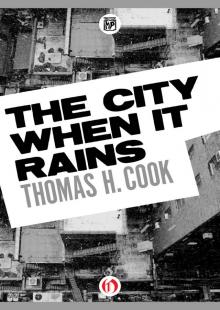 The City When It Rains
The City When It Rains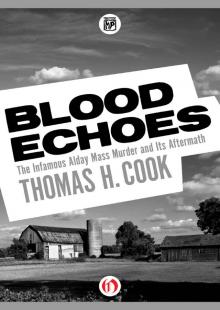 Blood Echoes
Blood Echoes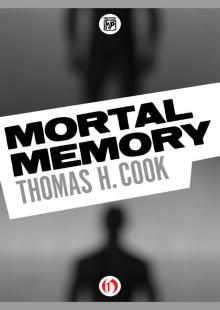 Mortal Memory
Mortal Memory Evidence of Blood
Evidence of Blood Into the Web
Into the Web The Crime of Julian Wells
The Crime of Julian Wells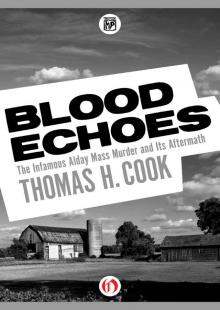 Blood Echoes: The Infamous Alday Mass Murder and Its Aftermath
Blood Echoes: The Infamous Alday Mass Murder and Its Aftermath Night Secrets
Night Secrets Places in the Dark
Places in the Dark The Orchids
The Orchids Elena
Elena Streets of Fire
Streets of Fire Instruments of Night
Instruments of Night Sacrificial Ground fc-1
Sacrificial Ground fc-1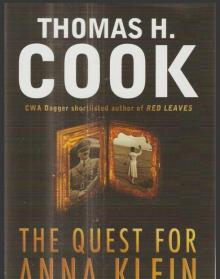 The Quest for Anna Klein
The Quest for Anna Klein Sandrine's Case
Sandrine's Case Quest for Anna Klein, The
Quest for Anna Klein, The Fatherhood
Fatherhood Flesh and Blood
Flesh and Blood Red Leaves
Red Leaves